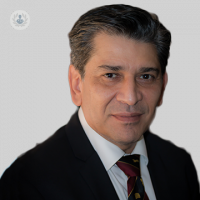Insights into salivary gland surgery: Procedures, risks, alternatives, and recovery
Written in association with:In his latest online article, Mr Peyman Alam gives us his insights into salivary gland surgery. He talks about when it is required, how it’s performed, the risks, the main alternatives and recovery.

When is salivary gland surgery required?
Let's talk a bit about salivary glands. We've got three main pairs: the submandibular glands under the jaw, the sublingual glands under the tongue, and the parotid glands in front of the ears. When it comes to the submandibular gland, the most common reason for surgery is when there's a blockage. This can happen if a stone forms in the duct of the gland and other simple treatments don't work. For the parotid glands, surgery might be needed for a few reasons. There could be tumours, usually not cancerous but sometimes cancerous. Other reasons include long-lasting infections and swelling that doesn't get better with normal treatments. In rare cases, surgery might be needed to control too much saliva coming from the parotid gland.
How exactly is it performed?
How the procedure is done depends on which salivary gland we're talking about. For the glands under the tongue, they're accessed through the mouth. For the ones under the jaw, small cuts of around 4 to 6 centimetres are made below the jawline. For the glands in front of the ear, the method involves making a cut in that area, extending it behind the ear and into the neck to hide most of it.
What are the main associated risks?
There are two kinds of risks for this surgery: general ones that are common for any surgery, like infection, bleeding, swelling, and pain. Then there are specific risks that depend on which gland is being operated on.
For the gland under the jaw, the main risk is harming a nerve that affects how the tongue feels, although this isn't common. There's also a very rare chance of hurting a nerve that controls the mouth corner movement, which is part of the facial nerve.
For the gland in front of the ear, the main risk is damaging nerves that control the face muscles. Depending on which nerve is affected, a patient might lose movement in that part of their face. Other risks include numbness in the earlobe and something called Frey's syndrome. This makes you sweat when eating due to nerves connecting to sweat glands.
With the gland under the tongue, the main risk is hurting the nerve that affects tongue sensation. If this nerve is affected, it might cause tongue numbness or change how it feels. There are also other rare complications that can happen.
What are the main alternatives? Is salivary gland surgery always the best option?
When it comes to salivary gland issues, surgery isn't always the first choice. There are different ways to handle the problems, and the best approach depends on what's going on. Some options include:
Trying simple fixes: Sometimes, small changes or basic treatments like medicine or pain relief might be enough.
Taking medicines: Certain conditions can be treated with medications that help with symptoms or reduce inflammation.
Gentle treatments: For some problems, doctors might use methods that don't involve big surgeries, like using tiny tools to fix things.
Breaking own stones: Instead of surgery, sound waves can be used to break up small stones in the glands.
Boosting saliva: Certain medicines can help your glands make more saliva if dry mouth is the issue.
Physical therapy: If your face muscles are having trouble, exercises might help without needing an operation.
Waiting and watching: Sometimes, it's better to wait and see if things get better or worse before deciding on surgery.
Other choices: Depending on what's going on, things like acupuncture, natural remedies, or diet changes could also help.
What is recovery time like, and will I need to undergo this surgery again?
Recovery time after the surgery is usually around one to two weeks, but it varies based on which gland is treated and what kind of surgery is done. If there are any problems or complications, it might take longer to recover. In terms of the surgery itself, whether it's done once or needs to be done again depends on the type of surgery. For example, if they try using a small camera to get rid of a stone and it doesn't work, the patient might need more treatment or even have the gland removed.
Mr Peyman Alam is a distinguished maxillofacial surgeon with over 20 years of experience. You can schedule an appointment with Mr Alam on his Top Doctors profile.



